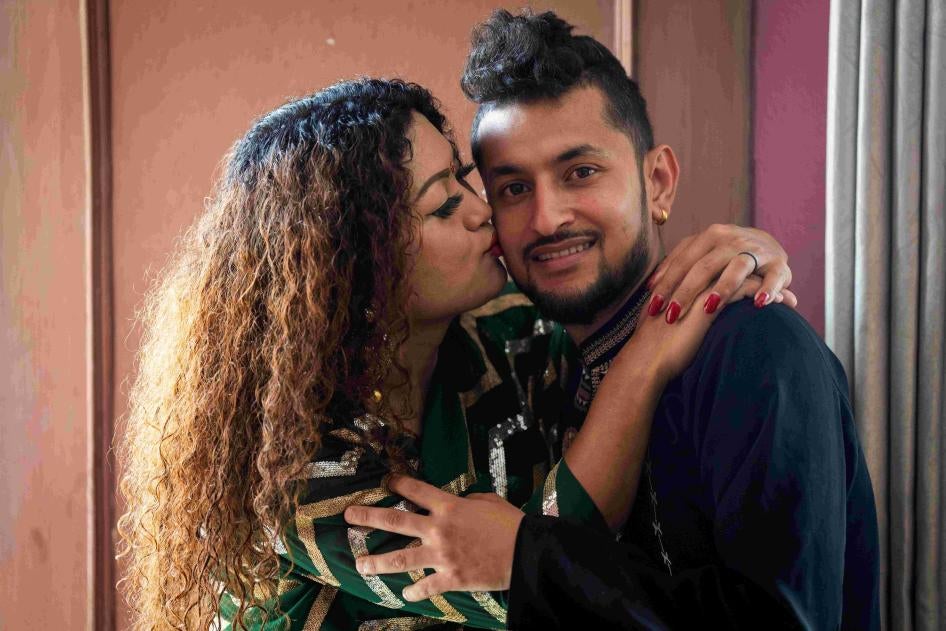At the end of November, Nepal’s government recognized a marriage between Nepalis of the same legal gender for the first time. But while the jubilant celebration undoubtedly deserves attention, various court cases and the country’s inconsistent bureaucracy make it virtually impossible for most queer couples to marry.
Maya Gurung and Surendra Pandey’s case first made headlines following an interim order issued by Nepal’s supreme court in June. Gurung is a transgender woman who is legally recognised as male and Pandey is a cisgender man.
The interim order instructed the government to create a separate register for marriages between people of the same sex as well as third gender people, who have been recognised in principle based on self-identification for over a decade.
The idea was to give queer couples interim legal recognition while the court officially deliberates a pending marriage equality case – but so far Nepali officials have been inconsistent in applying it.
Gurung and Pandey first attempted to legally register their marriage at the Kathmandu District Court, but it was rejected stating that it didn’t recognise same-sex relationships. They then appealed to the Patan High Court in September, but were rejected once more, with judges stating it was the responsibility of the federal government to change the law first.
It was only when Gurung’s rural home district of Lamjung issued them a temporary marriage certificate that they were finally able to legally tie the knot on November 29.
Their battle highlights just how piecemeal and subjective the process of applying court rulings can be in Nepal.
Other couples have fought – and sometimes won – to have their marriages recognised. Two same-sex couples in which one partner was Nepali and the other a foreigner were able to get the foreigners on spousal visas, in 2017 and 2023 respectively, but both had to take their cases to the supreme court to make it happen.
These high-level legal battles illustrate how inaccessible marriage registration remains for most queer couples in Nepal. Such litigation is time consuming, expensive, and exposes people’s personal lives to the public.
Nepal’s supreme court’s issued a groundbreaking judgment in 2007, becoming the first judiciary in the world to recognize the rights of LGBTQ+ people on the basis of the freshly-minted Yogyakarta Principles, a human rights document published in 2006 amid worldwide anti-LGBT violence and discrimination.
In that judgment, the supreme court ordered the government to form a committee to study same sex relationship recognition, and in 2015 the committee recommended the government “grant legal recognition to same-sex marriage on the basis of the principle of equality.”
However, successive governments have since failed to bring legislation on marriage equality, leaving queer couples in a legal lurch. Lawmakers should move swiftly on this point, and introduce a marriage equality bill in parliament.
There are plenty of reasons to laud Nepal for its influence on the global LGBT rights movement. Nepal’s strides on transgender rights have resonated around the world, with a case against the US State Department advocating to recognize an “X” gender on passports referenced Nepal’s jurisprudence.
The nation also elected Asia’s first openly-gay federal-level politician in 2008, and the 2015 constitution explicitly protected sexual and gender minorities.
The prime minister’s office has also indicated to LGBTQ+ rights activists that they are taking the supreme court’s interim order seriously, while the Ministry of Home Affairs gave its blessing to the local officials who registered Gurung and Pandey’s marriage.
These are all positive signs, and demonstrate how certain parts of Nepal’s government are upholding their human rights obligations.
So while the Gurung-Pandey nuptials certainly signal a bright future, there remains work to be done to ensure other couples can access relationship recognition on equal footing. Nepal is inching closer to the major superlative of being Asia’s second country—after Taiwan in 2019—to achieve marriage equality.









